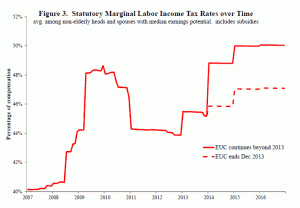Did the period from early November through early January comprise the most remarkable advances in the history of federal mental health policy? It’s a defensible argument. To learn why, check out my latest post at Stanford School of Medicine’s SCOPE blog.
How-are-the-mighty-fallen! dep’t: Bob McDonnell and the corruption that flows from inequality
I won’t pretend to be sad about the indictment of former VA Governor Bob McDonnell on corruption charges. If I have any compassion to spare, I’ll use it on the children of poor families in Virginia denied medical coverage by McDonnell’s refusal to accept Federal money to expand Medicaid. I hope McDonnell and Chris Christie share a prison cell and come out dedicated advocates for correctional reform.
But there’s one deeply, deeply twisted element to the story that ought to worry all of us. McDonnell was the Governor of Virginia, the successor of Jefferson. And he wanted a Rolex watch.
Now, I can understand a salesman who wants a Rolex to show that he’s a successful salesman. Money is how salespeople keep score, and without expensive wristwatches and suchlike how is anyone going to be able to tell a successful salesman from a wannabee? But if you’re the #$!@ing Governor of Virginia, what on earth do you need a Rolex for? As a status symbol? Isn’t t he title “Governor” pretty good status indicator?
One of the many problems that flows from increasing inequality of income and wealth is that the standards of the rich become the ruling standards. Mrs. McDonnell obviously felt that she would be disgraced if she appeared at her husband’s inaugural ball in the sort of dress an honest public servant’s wife could afford, when all the fundraisers’ wives - to say nothing of the female fundraisers - would be wearing a large fraction of the median annual household income. Does that excuse her committing extortion to get an Oscar de la Renta dress? Of course not. But it testifies to a corruption of manners that goes far deeper than corruption in office.
The extreme wealth of the rich is as great a public menace as the poverty of the poor, and great wealth is a greater problem than high income. Some of the way that money is made is destructive, and much of the way it is spent is even more destructive.
It would help if, at official functions such as inaugurations, our elected leaders and their families discouraged conspicuous waste among their guests and refrained from it themselves.
My $15 wristwatch from Target keeps excellent time, and - to my eye - looks pretty damned elegant.
But if I were a surgeon or an investment banker, I couldn’t afford to wear it. That, I submit, is a problem. And one part of the solution is for the President of the United States to wear, and let it be known that he wears, a cheap wristwatch. Not as important as restoring the estate tax, of course, but it’s a start, and it could be done tomorrow.
Is cannabis addictive?
My dad will never stop smoking pot. Sometimes I wonder about the man he might have been, and the lives we all might have had, if he’d never started.
As I keep saying: the evils of prohibition do not disprove the evils of substance abuse. In the case of cannabis, it’s probable that we could get rid of the former without greatly increasing the latter. But it’s not automatic. And denying that cannabis abuse is a real problem doesn’t help.
Note how the mythology of “addiction” cultivated by the “drug-prevention” effort and the drug-treatment industry interferes with understanding. Most drug abuse is very unlike the horrible picture painted in the linked story: it’s relatively transient. And most people who use “addictive” drugs don’t get addicted to them; substance abuse happens to only a minority of users, and only a minority of abusers actually have the “chronic, relapsing disorder” touted as typical. Bad habits around drug-taking are like other bad habits: they lie along a spectrum, and not everyone who uses a drug that turns out to be habit-forming in others encounters a problem.
But if you have the problem, or your brother, or your son, or your mother, it’s a serious problem. And the risk can’t just be wished away. If you support making cannabis available from profit-seeking commercial vendors, heavily marketed, and cheap - which is the path Washington and Colorado are walking down right now - then the predictable result of your preferred policy will be more people with very bad cannabis habits. And there could be fewer such people if cannabis were kept expensive, if marketing were kept to a minimum, and if users were offered modest helps to their self-command, such as user-set periodic purchase quotas, or if we keep the commercial motive out of the business altogether with state stores or by limiting vendor licenses to consumer-owned co-ops and not-for-profit businesses with boards concerned with limiting drug abuse rather than maximizing revenue.
Of course you’re free to oppose all of that. But if you do so, you ought at least to acknowlege the inevitable human cost.
David Kennedy on reducing violence
If you care about homicide, click through. Key points: We know how to reduce bloodshed, and violence suppression doesn’t depend on indiscriminate, intrusive use of police power. Again: We know how to do it.
Note to Radley Balko: Congratulations on your new gig at the Washington Post. Your criticisms of police excess - often spot-on - would have more cred if, just once, you celebrated police success, or noticed that liberty can be threatened by crime as well as by official misconduct.
Concerning lies, hatred, Jewish ethnicity, and the word “especially”
This is a long, sad, and (except to me) fairly boring story about hate-mongering and its stablemate, dishonesty. It’s about the word “especially,” and about the difference between being a Jew and responding to something, on the one hand, and responding to it based on one’s Jewishness on the other. It’s posted mostly in self-defense.
If the inticacies of idiocy and mendacity don’t interest you, I suggest skipping to any other item on the blog, guaranteed to be more uplifting and edifying.
Continue Reading…
Marginal Labor Income Tax Rates under the ACA
I was a discussant of Casey Mulligan’s paper Average Marginal Labor Income Tax Rates Under the ACA at the UNC Tax Symposium hosted in Chapel Hill, NC by Doug Shackelford this past Saturday. His figure 3 summarizes changes in the marginal tax rate of labor income over the past 7 years, accounting for both explicit and implicit taxes for someone with median wages. For example, in 2014, there is an increase in the marginal rate due to a reduction in work incentive that occurs for someone with median wages because premium subsidies are based on a income-linked sliding schedule-an implicit tax on earning more because you lose insurance subsidy as you earn more income. The paper also identifies increased implicit incentives to work more, for example, the fact that exchange subsidies cannot flow to those below 100% of poverty.
U.S. Marijuana Possession Enforcement Intensity is Down Over 40%
Future historians of drug policy will appropriately regard the recent legalization of recreational marijuana in Washington and Colorado as a significant reduction in U.S. law enforcement’s role in cannabis regulation. Yet that marijuana enforcement policy shift had been underway for a lot longer than many people realize.
The chart below presents 2007-2012 FBI Uniform Crime Reports data on marijuana possession arrests and National Survey on Drug Use and Health data on aggregate days of American marijuana use*. To put the two lines on the same scale, aggregate days of marijuana use are reported in 10,000s. The most striking feature of the data are that the two lines are going in opposite directions. The net result is a 42% decline in marijuana possession enforcement intensity (i.e., the number of arrests per day of marijuana use).
Americans’ marijuana use went up by almost 50% just from 2007-2012. This sharp increase in the population’s total days of use has been driven less by the increased number of users than by the big increase in the number of individuals using heavily (e.g., smoking every day or nearly every day). That growth in use meant there was a large increase in police opportunities to arrest people for marijuana possession. But marijuana possession arrests have instead been falling as numerous states have passed decriminalization laws (with for the first time in U.S. history, no White House opposition) and/or created loosely-regulated medical marijuana systems.
The data in the chart support at the least three conclusions about marijuana policy:
(1) U.S. Marijuana possession enforcement intensity had become light even prior to the passage of legalization in two states. As of 2012, the average American once-a-week pot smoker would expect to be arrested for possession about once every century. This reality isn’t evident when one focuses just on the number of arrests, or on how arrests compare to some irrelevant standard (e.g., number of arrests per minute or the percentage of all drug arrests that are for marijuana).
Conclusions about how intensely a crime is being policed can only be drawn in the context of information on how often that crime is committed. Six hundred fifty thousand arrests is a big number in the abstract, but relative to over 3 billion days of marijuana use, it’s small. That why the U.S. can have a large absolute number of marijuana possession arrests yet at the same time be policing marijuana at a less vigorous rate than do most developed nations.
(2) There is no evidence of “net-widening” in U.S. marijuana enforcement policy. In some regions, such as New South Wales, Australia, reduction in criminal penalties for marijuana use led to an increase in arrests. Apparently, Australian police officers who previously felt penalties were too tough began feeling comfortable widening their enforcement net to intervene in more cases of marijuana use. This phenomenon has not been replicated in the U.S., where severity of penalties and number of arrests have been falling in tandem.
(3) Changes in official marijuana policy are often a formalization of what has already been evolving on the ground. The creation of recreational marijuana markets in Washington and Colorado (with some other states likely to follow) is in one sense qualitatively new. Yet it is also the culmination of an established trend of rapidly declining law enforcement involvement in the regulation of marijuana. That’s one reason why it’s often hard for observers to determine whether new drug laws have a unique causal effect or are more a ratification of informal policies that were already in place.
*My thanks to Dr. Beau Kilmer and his team at RAND for providing me with days of use data.
A Measure of the Sin is Coming to Austin and Atlanta
 Fresh off of being named one of the best independent movies of 2013 by FilmBizarro, A Measure of the Sin has been made an official selection at two more upcoming film festivals:
Fresh off of being named one of the best independent movies of 2013 by FilmBizarro, A Measure of the Sin has been made an official selection at two more upcoming film festivals:
The Days of the Dead Festival in Atlanta, February 7-9.
AND
The RxSM film festival in Austin, Texas on March 6.
Reviews, list of awards and trailer are all on line here.
Here’s a recent review by Mark Krawczyk which I found very perceptive
Bleg: polite and up-to-date substitute for “happy horsesh*t”?
In a draft essay that I sent out to colleagues for comment, I used the phrase “happy h.s.,” assuming that the meaning “Absurdly and probably insincerely over-optimistic prediction, explanation, or interpretation from official or semi-official souces” would be familiar. In fact, two of my friends - neither much more than a decade younger than I - weren’t even sufficiently acquainted with the phrase to expand the initials.
Note that HHS is not synonymous with BS; rather, it is a sub-category under BS.
So: Does contemporary idiom have a comparably punchy (and if possible less pungent, or at least more printable) phrase that means the same thing?
Journalism v. hackery
Jennifer Rubin is a partisan hack. So is Stuart Rothenberg. So is Ruben Navarette. And of course Rich Lowry.
Query: Is there anyone telling us now that Christie is, or might be, innocent who wasn’t telling us in October 2012 that Mitt Romney was going to win or that the election was “too close to call”?

